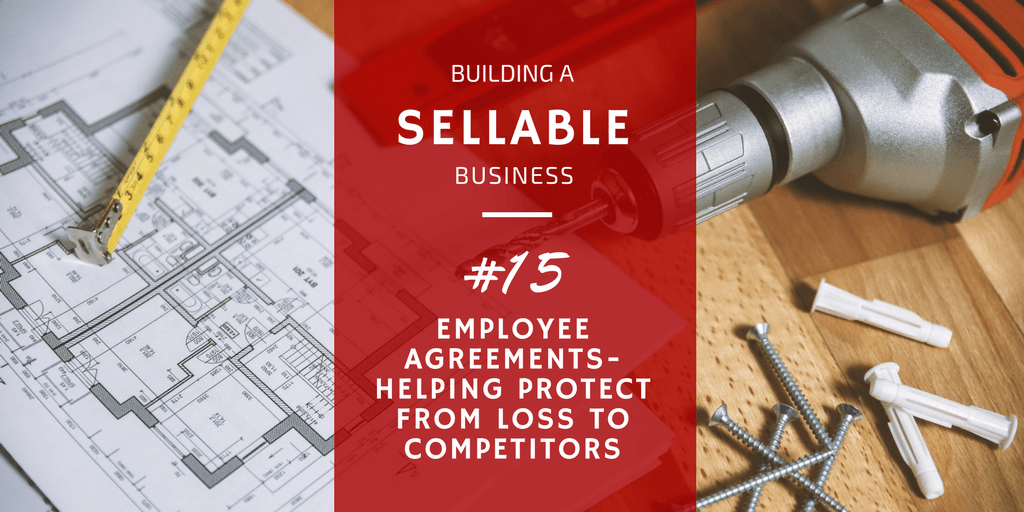
A Business Risk Assessment Today Can Boost Value Tomorrow – Post #13
December 28, 2017
Employee Agreements – Helping Protect from Loss to Competitors – Post #15
January 11, 2018Employee Incentive Programs – Which Best Fit Your Business? – Post #14

In this Building a Sellable Business series, we just talked about the business risks we entrepreneurs face. To most people, the possible risks seem to outweigh the benefits of business ownership. What makes us willing to face those risks, with market ups and downs, with high-pressure competition, and significant debt? If we’re honest, it boils down to an expectation of success, usually a monetary success. If money motivates us business owners, what employee incentive programs could motivate our team members?
Ultimately, we’re building a business that will sell for millions. We discussed how recruiting an all-star team increases the value of our business in Episode #6. We also talked about how treating your team well further accelerates your value growth in Episode #10. In this article, we’re going to talk about how creating employee incentive programs can enhance employee happiness within and employee loyalty to your company. A happy and successful team member helps maximize the money you can make at the sale of your business.
Podcast Time Index for “Employee Incentive Programs – Which Best Fit Your Business Structure?”
00:39 – A rising tide lifts all ships
02:41 – Why did you start the company?
03:41 – Monetary Motivation
06:00 – How to build a dedicated Team
07:52 – Keep Your Equity
10:24 – Share the Success
12:30 – Take care of Your Leaders
13:58 – Reward actions You want to encourage
14:50 – Ways of Rewarding
20:50 – Educate Your Team
My Success is Your Success
Years ago, a company recruited a friend of mine to grow its small business into a multi-million-dollar business within a short period of time. When the owner hired Chris, the owner promised him shared income and incentives. He said, “Look, we’re gonna share in the profits. We’re gonna share in the company. Your success as a team member is gonna be my success as the owner. My success as the owner is gonna be your success as a team member.”
Well, my friend took that company from 10 million dollars to more than 300 million dollars in revenue within that time frame. And when the owner sold the business, he followed through on his promise and provided my friend with the biggest paycheck he’s ever received. Chris actually calls it a “life-changing check.” When he wrote about that payday in his book, Walking to Destiny, my friend Christopher Snider said, “Man, this [check] changed my life. This is what changes legacies for families.”
Building Employee Dedication
As you approach the sale of your business, you may be faced with questions from your team members about their role in your company’s future. Whenever you tell your team that you intend to sell your business within so many years, it can cause major concern. Those younger team members will worry about their future job security. On the other hand, the more seasoned employees will worry about losing their seniority or respect in a “hostile” takeover. Emotions run amuck whenever we business owners talk about selling our company.
I often ask myself and clients I work with, “How can we build a team dedicated to helping us reach our goal to sell the business?” If you have a stable bench of team players who help you realize profit when you sell your business, more than likely, you’ll want to be philanthropic. You’ll want to show benevolence towards those individuals who are in the dirt and the grime, pulling towards the goal with you.
Employee Incentive Strategy Goals
Before you “give away the farm”, so to speak, let’s look at strategies you can implement to incentivize employees and still have your desired pay-out upon the sale of your business. Keep these concepts in the back of your mind while you decide what incentives to offer:
- Give all team members a way to piggy-back on your company’s financial success.
- Have contingencies in place to ensure the commitment of your executive team if a buyer requires their expertise.
- Reward the team members for actions you want to encourage.
Long-Term Employee Incentive Programs
So what kind of rewards can you offer employees? If you don’t plan to give away our stock shares, but you want to be benevolent and fair, what do you do? One way to incentivize team members over the long-term course of their employment is to offer them a stock-option. While I could spend multiple blog posts on the topic of stock-options, my goal of this article is just to introduce you to the idea at its highest level.
I’ll tell you, too, that if you’re going to entertain the idea of a stock-option plan or stock options for your company, you’ll want to have a competent attorney and a power-house accountant on your professional advisory team. There are plenty of red-tape barriers and legal risks surrounding stock-options, so you’re going to need a good consulting team.
Create A Stock-Option Employee Incentive Plan
So at its simplest, a stock-option plan is when you provide your employees with an option to buy stock in your company. Notice, I didn’t say that you’re giving your employees stock in your company. No, you’re providing them with the option to purchase stock in the company. At the same time, you’re controlling most aspects of the stocks in this stock-option. You are:
- setting the number of shares or units employees can purchase
- fixing a purchase price for each available share
- creating a vesting timeline
In Matthew 6:21, Jesus says, “For where your treasure is, there will your heart be also” while speaking to a group of religious disciples. I believe that Bible verse applies to today’s employee incentive program topic. If you can get an employee to invest the money he earns into the very company for which he works, then you have a dedicated employee. You have someone who sees value in your business and puts his dollars to work within it.
Phantom Stock Options
Now the stock-option method eventually has you give up stock in your company. But what happens if you don’t want to give up stock? There’s another way to offer long-term employee incentives. Some people call this incentive strategy phantom stock or stock appreciation rights. Basically, in this method, you’re providing money to the employee without ceding ownership or control.
Within a phantom stock-option, you can create a bonus structure for key employees that pays them based on a “phantom,” or figurative ownership, share in your company. So while you own 100% of the stock in your corporation (member units is an LLC), you can pay your employees an ownership percentage when your company does well. That way, your employees don’t get all up in your business, so to speak, but they stay motivated and dedicated to your end goals.
Short-term Employee Incentive Programs
Not all employees see a long-term reward as a reason to stay at a place of employment. Therefore, business owners should probably offer “sweet treats” along the way. Short-term employee incentive plans can keep your team members happy and motivated so they don’t look for positions at your competing companies. You don’t want to train your employees to work for or to become your competition. Positive reinforcement and instant gratification can work like a carrot held out on a stick does for a donkey. Short-term employee incentives can also foster team member harmony and cohesion.
So what types of things might motivate employees?
- Recognition – If an employee does a good job, reward him openly with verbal praise. A simple “thank-you” or “good job” can make almost anyone feel appreciated, wanted, and needed.
- Fringe benefits – Healthcare benefits, 401K matches, and the like can set your company above your competitor’s in the eyes of employees.
- Paid time off – The opportunity for earned and compensated time-off adds value to your employee workplace.
- Annual bonuses – Merited or unmerited, a Christmas bonus or a work anniversary bonus can add to employee happiness and commitment to your company.
- Production based rewards – Employees can become extremely motivated to work hard if they know they can earn trips to desirable locations, monetary bonuses, redeemable merchant gift cards, or many other types of gifts.
- Peace and happiness – Incentives don’t always come in time, gifts, or money. Simply creating a respectful and happy work environment can create employee loyalty for years to come.
Offer Employee Incentives the Correct Way
Whichever way you decide to incentivize employees, make sure you have a good lawyer and an amazing accountant to guide you. You’ll need help wading through the rights, warrants, risks, and taxes that come with stock ownership, stock options, fringe benefits, paid time off, bonuses, and gifts. But let me give you a word of caution. Don’t go to your next team meeting and mention to your employees that you’re considering incentives until you’ve talked to your professional team. You shouldn’t blindly offer something you may ultimately find too risky. Additionally, you don’t want to offer your employees incentive programs without educating them about the guidelines and requirements involved.
Employee incentives can help your employees catch your vision to grow and sell your business. Financial gain can motivate owners and employees. So rewarding every member of your team, from the maintenance man to the CEO, can build the value of your team and consequently the company when you are ready to sell it.




